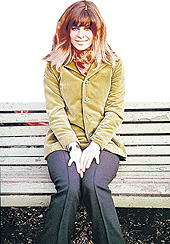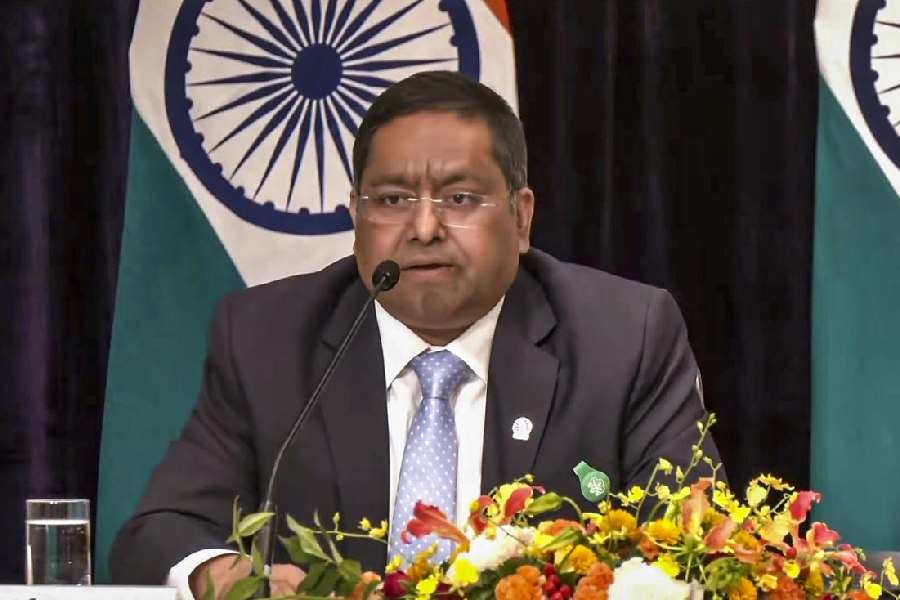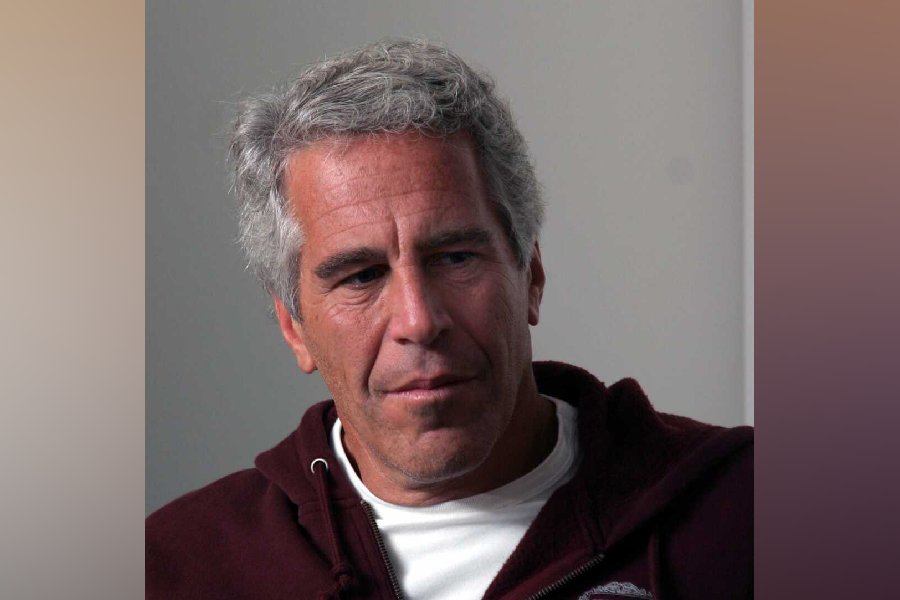 |
A new Julie Christie film is nowadays a rare phenomenon but with a bit of luck, her new movie, Away From Her, in which she plays a woman suffering from increasing memory loss because of Alzheimer’s, will be seen in India.
With a little more luck, she herself will be back in India, not least because it is the land of her birth. Perhaps it is not that well known in India that the stunningly beautiful blonde with whom men all over the world fell in love after she had played Lara opposite Omar Sharif in Dr Zhivago in 1965, was born Julie Frances Christie, an English tea planter’s daughter, in Chabua, in Dibrugarh district in Assam, on April 14, 1941. Her early years were spent in India until, as was the way with the Raj types, she was sent to school in England to have native ways knocked out of her.
In some ways, her own life reflects the character she portrayed in the 1983 Merchant Ivory film Heat and Dust, based on the novel by Ruth Prawer Jhabvala, of an Englishwoman who returns to India to uncover the mystery of her great-aunt’s love affair with India and an Indian prince. Her father, Frank St John Christie, who ran a tea plantation in Assam, had Julie and a son, Clive, from his marriage to Rosemary Ramsden, a Welsh painter and childhood friend of the actor Richard Burton.
Christie’s parents separated when she was still a child and her father died at a relatively young age. Her mother returned to rural Wales where Christie grew up after her Indian childhood. Today, after having done the Los Angeles bit, she has one home in Wales and another in north London.
Some actresses (and actors) are imbued with such God-given beauty and talent that they are born to be celebrities. Others either acquire celebrity status or have it thrust on them . But howsoever acquired, for much of the last three decades Christie has been the celebrity best known for being the anti-celebrity.
“If I don’t make films, no one is going to write about me,” she told The New York Times this year in one of only two substantive interviews she has given in recent years. “And most people have forgotten who I am anyway. My life is not interrupted because I am more or less anonymous.”
She may not be a page three girl or hog the gossip column of the tabloids but she certainly kept diary columnists busy during her passionate seven-year affair with the Hollywood heart throb Warren Beatty, with whom she made McCabe & Mrs Miller (1971), Shampoo (1975), and Heaven Can Wait (1978). Before that, in 1973, she shot a then much talked about “did they, didn’t they?” explicit sex scene with Donald Sutherland in Don’t Look Now. Sutherland was one of the men in her life but she appears never to have recovered from the end of her relationship with Beatty. She has certainly insisted on never getting married, though she has had a long-term relationship with a Guardian journalist, Duncan Campbell.
What no one can deny is that Christie has been one of the most gifted actresses of her generation. As the production company behind Away From Her points out, “John Schlesinger cast her as the silly, superficial, morally threadbare Diana of Darling (1965), for which she won the Oscar, a BAFTA and the New York Critics’ award, and which is now powerfully resonant of its period, and again as Thomas Hardy’s wilful Bathsheba in Far from the Madding Crowd (1967), with other 60s icons, Terence Stamp and Alan Bates.”
Her performance and that of Omar Sharif have ensured that Dr Zhivago, directed by David Lean, is one of the great classics of cinema. To her fans across the world, this adaptation of Boris Pasternak’s masterpiece is possibly the film that defines Julie Christie. It was madness on her part, of course, that she wanted to turn down the role. In fact, the number of roles she has turned down for which actresses would have given their all is possibly even longer than her credit list.
As far as Christie is concerned, the past and her own starring role in it is another country. “I have no connection with that person at all,” she also told The New York Times. “That person is gone.”
She undertook the role in Away From Her because she is fond of the director, Canadian actress Sarah Polley, who is only 27 and whom she met in 2000 while working in Iceland on the set of Hal Hartley’s No Such Thing. It was her last major film, though she has had bit parts in Harry Potter and the Prisoner of Azkaban (2004), Finding Neverland (2004) and Troy (2004). But she reckons the small parts are done under sufferance to help her pay her roof mending bills.
Away From Her has been adapted from Alice Munro’s short story, The Bear Came Over the Mountain, which Polley read in The New Yorker on a flight back from Iceland. She was moved and kept seeing Christie’s face in the lead role of Fiona Andersson. It is the tale of a woman whose memory loss has become so bad that she has to go into a nursing home, where she falls in love with a male patient, forgetting her own devoted husband of 50 years.
“Julie is captivating, magnetic and stunningly beautiful,” says Polley, who has only ever conceived of Christie in the main role. “She has the sharpest mind and this piercing gaze into other people. She’s full of life and wonder and curiosity, and it’s impossible not to fall in love with her. But you are always chasing her because she’s with you one second and not the next and that was exactly my experience with the character of Fiona in the short story. All you have to do is see her in anything from Darling to Afterglow to know she’s a brilliant actress, but I wanted to see her in a role that was more complex. I really had a fascination with her and that’s ideal when making the film.”
Christie returned the compliment when she said to The New York Times: “I fell totally in love with her. Of course, when she sent me this screenplay, I said no. But she kept on and on. She said she felt like a stalker. In the end, I thought, if I don’t do it, I’ll miss the opportunity of being with her on her first feature film.”
An explanation for Christie’s “de-celebritisation” is available from Tim Adams of The Observer newspaper who was granted an audience with her in April.
“The anxiety and the desire to escape it (the celebrity life) were partly, she suggests, rooted in her childhood,” wrote Adams. “Christie grew up during the war in India, in Assam, on a tea plantation that her father ran. This life was cut short at the age of six when her parents sent her back to England to go to a convent school and to live with a foster mother. The shock of that transition has never quite left her. She hated the school, hated being away from her mother. She was eventually expelled from her Catholic secondary school for telling a rude joke. When she won her Oscar at the age of 24 for her role in John Schlesinger’s Sixties morality film Darling, in which she played a model, the bed-hopping barefoot ‘Happiness girl’, she described going up to collect the award as like being once again called up in front of the whole school to explain herself.”
She will get another chance to explain herself, though this time she will be among friends, if she accepts an invitation to attend the convention of the Indian Tea Association from November 22-24.
Sujit Patra, its joint secretary who is coordinating the convention, says: “In 1993 and 2000 it was held in New Delhi. In 2003 it was held in Calcutta. This time it will be held in Guwahati.”
This year’s convention is special because it will be attended by the producing, export and trading communities as well as the Tea Board. And the place, Assam, Christie’s birthplace, is responsible for 50 per cent of India’s 950 million kgs of tea production.
The organisers certainly feel Christie’s presence will add a little extra flavour to the brew.










